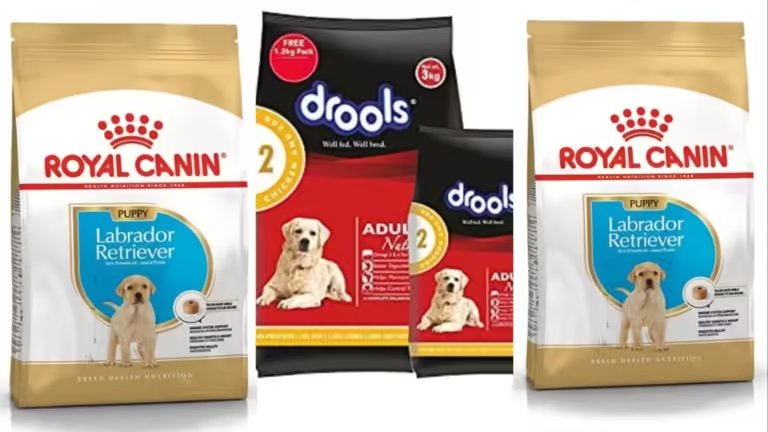Diet Solutions for Labradors with Chicken and Beef Allergies

Labrador Retrievers are known for their loving nature and energetic spirit, but when it comes to food allergies, particularly to common proteins like chicken and beef, finding the right diet can be a challenge. Managing these allergies through a well-planned diet is crucial to maintaining your Labrador’s health and happiness. In this article, we’ll explore safe and nutritious diet options that are both delicious and free from common allergens like chicken and beef.
1.Understanding Food Allergies in Labradors
Food allergies in Labradors occur when their immune system mistakenly identifies a specific ingredient as harmful, leading to an allergic reaction. Unlike food intolerances, which cause digestive discomfort, food allergies can result in a range of symptoms such as itching, ear infections, and skin irritations.These allergies can sometimes lead to vomiting, diarrhea, and other digestive problems.
Chicken and beef are two of the most common allergens found in commercial dog foods. These proteins, while nutritious for many dogs, can trigger allergic reactions in some Labradors. If you notice symptoms like excessive scratching, recurrent ear infections, or digestive upset after your dog eats, it may be time to consider an alternative diet.
2.The Importance of Choosing the Right Diet
Choosing the right diet is essential for managing food allergies in Labradors. A carefully selected diet can prevent allergic reactions, improve your dog’s overall health, and enhance their quality of life. For Labradors with allergies to chicken and beef, eliminating these proteins from their diet is the first step. By focusing on alternative protein sources and avoiding common allergens, you can help your Labrador lead a healthier, more comfortable life.
A well-balanced diet that meets all of your Labrador’s nutritional needs is critical. This includes providing high-quality proteins, healthy fats, essential vitamins, and minerals, while avoiding ingredients that could trigger an allergic reaction.
3.Alternative Protein Sources for Labradors
When your Labrador is allergic to chicken and beef, it’s important to explore alternative protein sources that are both nutritious and less likely to cause allergies. Here are some of the best options:
A. Fish-Based Diets
Fish is an excellent alternative protein source for dogs with chicken and beef allergies. Fish like salmon, herring, and whitefish are not only highly digestible but also rich in omega-3 fatty acids, which promote healthy skin and coat. Omega-3s also have anti-inflammatory properties that can help reduce symptoms of allergies.
B. Novel Proteins
Novel proteins are less commonly used in dog foods, making them ideal for dogs with food allergies. Proteins such as duck, venison, rabbit, and kangaroo are great alternatives for Labradors that can’t tolerate chicken or beef. These novel proteins provide high-quality nutrition while minimizing the risk of triggering an allergic reaction.
C. Plant-Based Proteins
For those considering a plant-based diet, proteins like peas, lentils, and chickpeas can be used as the primary protein source. While plant-based diets can be suitable for dogs, it’s important to ensure that the diet is well-balanced and meets all of your Labrador’s nutritional needs. Consulting with a veterinarian or a pet nutritionist is recommended if you’re considering this option.
4.Grain-Free and Limited Ingredient Diets
For Labradors with food allergies, grain-free and limited ingredient diets (LID) can be beneficial. These diets reduce the number of potential allergens and simplify the identification of ingredients that might be causing issues.
A. Benefits of Grain-Free Diets
Grain-free diets remove common grains like wheat, corn, and soy, which are often linked to food sensitivities. Instead, they use alternative carbohydrates such as sweet potatoes, quinoa, and peas, which are easier to digest and less likely to cause allergic reactions. These diets focus on providing high-quality proteins and essential nutrients without the added risk of grains.
B. Limited Ingredient Diets
Limited ingredient diets (LID) are designed to minimize the number of ingredients in your dog’s food, making it easier to pinpoint allergens. LID dog foods typically include a single protein source and a limited number of carbohydrates, reducing the likelihood of triggering an allergic reaction. Brands like Wellness Simple and Natural Balance offer LID options that exclude chicken, beef, and other common allergens, providing a safer choice for your Labrador.
5.Homemade Diet Solutions
Homemade diets can be an excellent way to manage your Labrador’s food allergies, as they allow you to control exactly what ingredients go into their meals. By preparing food at home, you can avoid allergens and provide a diet that’s tailored to your dog’s specific needs.
A. Advantages of Homemade Diets
One of the main benefits of homemade diets is the ability to eliminate all potential allergens and fillers that are often found in commercial dog foods. This control ensures that your Labrador’s diet is free from chicken, beef, and other ingredients that could cause allergic reactions. Additionally, homemade diets can be more palatable and easier to digest for dogs with sensitive stomachs.
B. Sample Recipes
Here are some simple, balanced homemade dog food recipes for Labradors with chicken and beef allergies:
- Fish and Sweet Potato Meal:
- Ingredients: Cooked salmon, steamed sweet potatoes, green beans, and a dash of olive oil.
- Benefits: Rich in omega-3 fatty acids and easy to digest, this meal supports skin health and overall digestion.
- Duck and Quinoa Stew:
- Ingredients: Cooked duck, quinoa, carrots, peas, and a splash of bone broth.
- Benefits: High in protein and packed with essential nutrients, this recipe is ideal for dogs with protein allergies.
When preparing homemade dog food, it’s crucial to ensure that the diet is nutritionally complete. Adding a dog-specific multivitamin and mineral supplement can help fill any nutritional gaps. Always consult your veterinarian before switching to a homemade diet to ensure it meets your dog’s specific needs.
6.Commercial Dog Foods for Chicken and Beef Allergies
If you prefer the convenience of commercial dog foods, there are several high-quality options specifically formulated for dogs with chicken and beef allergies.
A. Top-Rated Commercial Brands
Here are some of the best commercial dog foods for Labradors with chicken and beef allergies:
- Natural Balance LID Duck & Potato Formula: This limited ingredient diet features duck as the single protein source and is free from grains, making it ideal for dogs with food sensitivities.
- Wellness Simple Turkey & Potato Formula: This grain-free, limited ingredient dog food uses turkey as the primary protein source and is designed to support dogs with food allergies.
- Zignature Kangaroo Formula: Featuring kangaroo as a novel protein, this formula is both high in protein and low in fat, perfect for dogs with multiple protein allergies.
B. Vet-Prescribed Diets
For Labradors with severe allergies, a veterinarian-prescribed diet may be necessary. Prescription diets like Hill’s Prescription Diet d/d and Royal Canin Hydrolyzed Protein are designed to manage food allergies and provide complete nutrition while avoiding allergens. These diets often use hydrolyzed proteins, which are broken down into smaller molecules, making them less likely to trigger an allergic reaction.
7.Monitoring and Managing Your Labrador’s Diet
Successfully managing your Labrador’s food allergies requires careful monitoring and ongoing adjustments to their diet.
A. Gradual Transitioning to New Diets
When introducing a new diet, it’s important to transition gradually to prevent further digestive upset. Start by mixing a small amount of the new food with the old food, gradually increasing the proportion of the new food over 7-10 days. This slow transition helps your Labrador’s digestive system adjust to the new diet without causing additional issues.
B. Regular Check-Ups
Regular veterinary check-ups are essential to monitor your Labrador’s health and ensure that their diet is working effectively. Your vet can provide guidance on any necessary dietary adjustments and help you identify any new food allergies that may develop.
C. Identifying Hidden Allergens
Even with careful planning, hidden allergens can sometimes make their way into your dog’s diet. Always read ingredient labels carefully and be aware of potential cross-contamination in commercial dog foods. If you suspect that a hidden allergen is causing issues, consult your veterinarian for advice on further dietary modifications.
Conclusion
Feeding a Labrador with chicken and beef allergies requires careful planning and consideration, but the results are well worth the effort. By choosing safe, nutritious, and delicious diet options, you can manage your dog’s allergies effectively and keep them healthy and happy. Whether you opt for alternative protein sources, grain-free diets, homemade meals, or commercial dog foods, the key is to find what works best for your Labrador’s unique needs.


